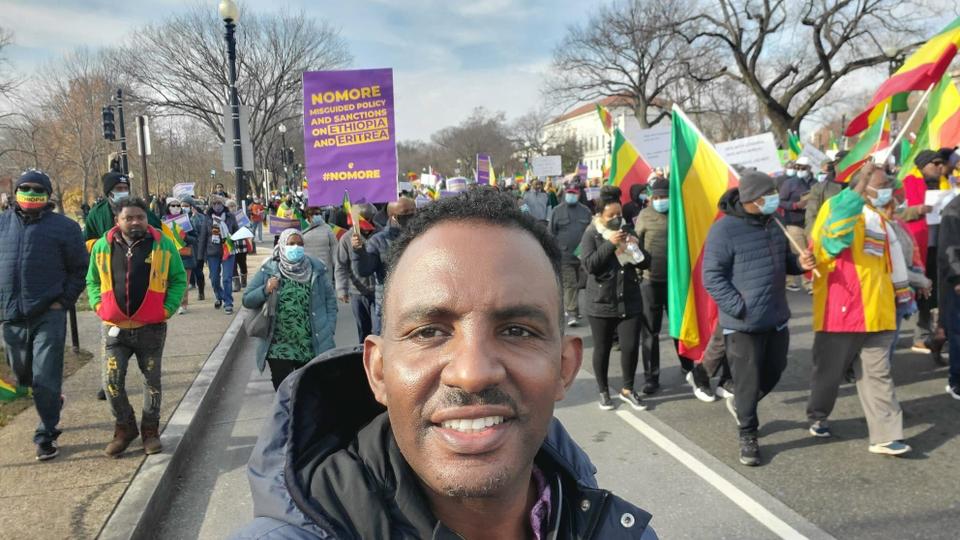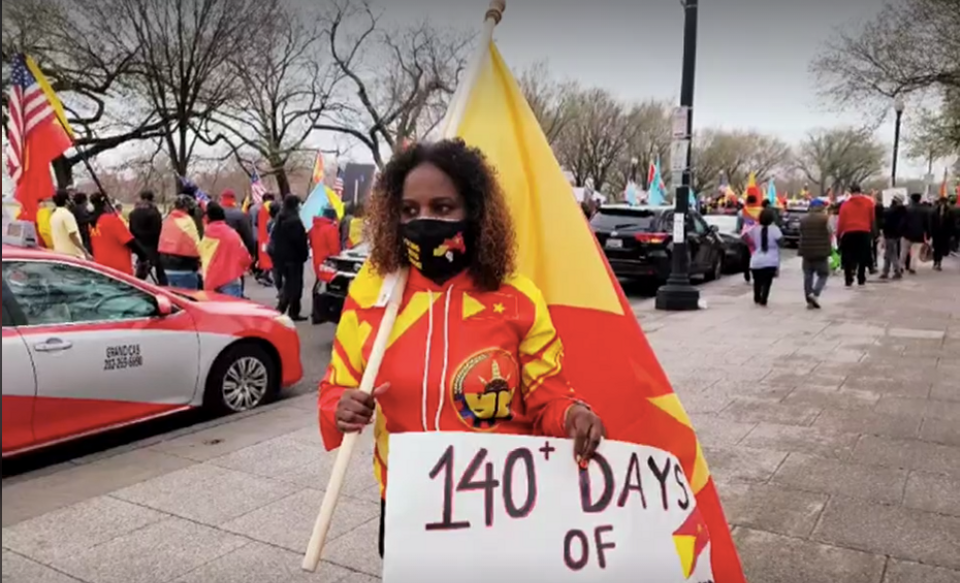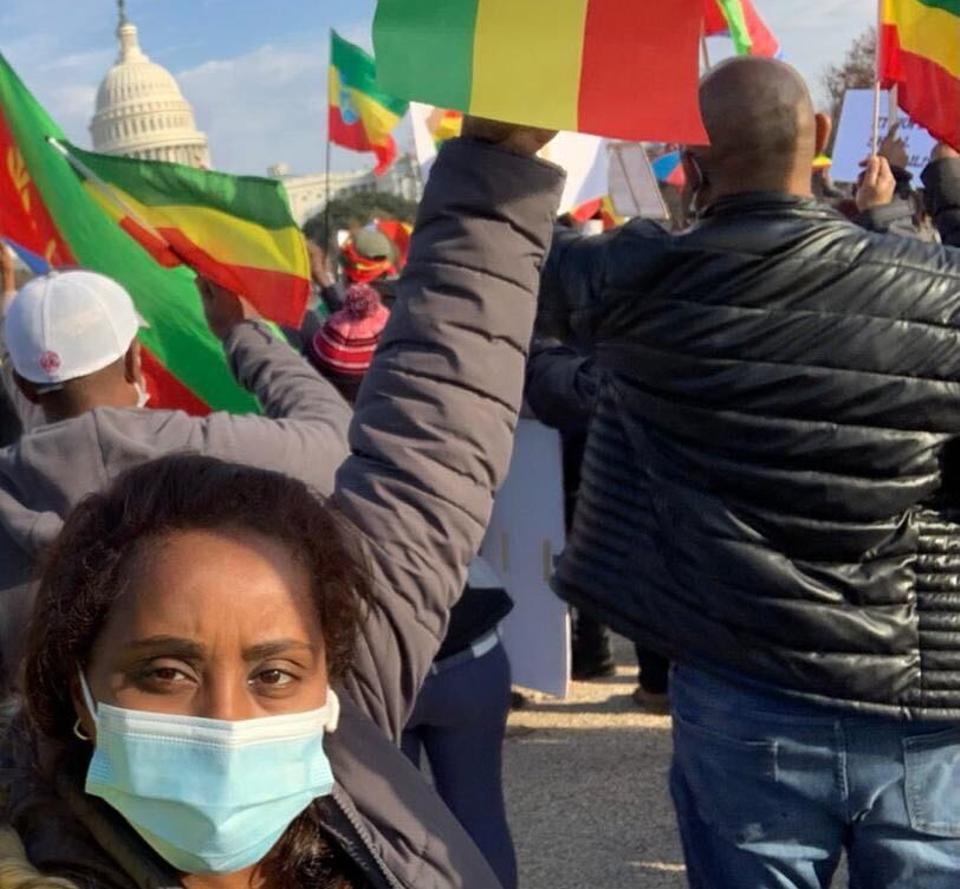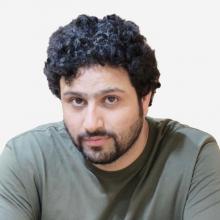The Ethiopian diaspora in the United States is divided over which side is fighting for the just cause – the government forces or the Tigrayan rebels. Such are the inter-community tensions that friendships are falling apart.
Washington DC/ Virginia — Shawel Betru (47) knows the heavy toll war takes on ordinary civilians. Because he has seen it all. He has even survived one back home in Ethiopia, lived through hell in a camp for internally displaced people (IDP). The Ethiopian-American was displaced from his village and spent some time in a refugee camp after his father — a farmer drawn into the military — and two siblings were killed in the 1977 Ogaden War, or the Ethio-Somali War.
But even now, living in the United States — far away from the conflict zones — the war continues to cast a shadow on Betru's life as well as other Ethiopians who have made the US their home.
"I was only three when all this happened. I understand the tragedy. I have gone through it. But Ethiopia never faced an existential threat that it faces today," Betru, an IT professional who lives in Virginia in the southeastern US, told TRT World.
"If the rebels get what they want despite committing huge atrocities, Ethiopia will disintegrate. Remember, the rebels have no history of a negotiated settlement. That's what elevates the fears."
For over a year now, Ethiopian government troops are anchored in a bloody conflict against the Tigray People's Liberation Front (or TPLF) after the Tigrayan rebels raided federal army camps in the northern Tigray region in November 2020. Since then, violence has spiralled beyond Tigray’s provincial borders –– thousands have been killed or wounded, hundreds of thousands displaced, truces failed, towns and hamlets decimated and violence snowballed into a full-blown diplomatic war between Ethiopia and several Western countries, including the United States, over what Addis Ababa sees as "foreign meddling" in its internal matters.
The violence is, however, no longer restricted to the Horn of Africa. It is slowly tearing apart the Ethiopian immigrant community and even families some 13,000 kilometers away in the US where more than 300,000 Ethiopia-born immigrants live, mostly in the capital Washington DC, and the neighbouring states of Maryland and Virginia.
For months they have held protests, both for and against the TPLF. They are divided over Prime Minister Abiy Ahmed's leadership, the role of the UN, the US and its allies, and the Western media.
The discord has crept into churches, social gatherings and even onto breakfast tables.
"We used to meet after church prayers every week," an Ethiopian taxi driver of Oromo ethnicity, speaking on the condition of anonymity, said of her Tigrayan friend.
"Now, she doesn't come to our church. She goes to a church where most of the worshippers are Tigrayans. We know our politics are different, but changing churches was unbelievable."
Bereket Abay, an Ethiopian immigrant of Tigray roots, has a similar grievance against his non-Tigrayan friends.
"I was always insulted and often ignored. There is no point keeping such friendships. How would you feel if you are not served in an Ethiopian restaurant because you are a Tigrayan?" Abay asked.
READ MORE: UN: Ethiopian government arrests at least 1,000 under state of emergency

Marriages at risk
Maheder Yismu, an Ethiopian-American, was recently in Addis Ababa when reports emerged that TPLF rebels were edging closer to the capital. As international alarm mounted, several Western countries advised their citizens to leave the Ethiopian capital, citing security concerns. Yismu said the alert was "unnecessary" and "magnified by the hostile media."
"I was in Addis at that time. I stayed there for (some) more (time), extending my flight back to the US. However, nothing happened. Despite the false propaganda by several western media outlets, Addis was alive and vibrant as always," Yismu, a pharmacist, told TRT World.
Yismu continues holding discussions with her Tigrayan friends in the US regarding the situation back home, "but the current situation definitely [has] created tensions."
"I don't believe TPLF represents all people from the Tigray region. I've friends whose family are from the Tigray region. We discuss the conflict. Sometimes we agree, sometimes we don't. Most of the time we have good discussions regardless of our views. But sometimes we avoid topics to save the friendship."
The war has poisoned inter-ethnic marriages too.
An Ethiopian-American of Tigrayan ethnicity, who wished to remain anonymous, told TRT World that the conflict has pitted her against her husband, an ethnic Amhara. The Ethiopians have been married for 14 years with children, 9 and 10 years old. The conflict in Ethiopia, she said, has put a wedge in their relationship.
"For several months, I had no idea where my mother and siblings were. Ethiopia had cut all communications with the Tigray province," she said.
"After seven months, I learned that they've moved to Addis Ababa. They are safe but my brother and brother-in-law have been arrested just because they are Tigrayans," she alleged.
She said her husband being an Amhara is pro-PM Abiy and has gone to Ethiopia "citing church services."
"It's been four months now. Last time he spent seven months in Ethiopia before flying back to the US," she said.
When they last met, the couple fought on the breakfast table.
"He told our children that Tigrayans are killing Amharas when the reality is that a genocide is going on against the Tigrayans. Ethiopians are brothers, but it's a brother killing brother. It's fratricide," she said.
"If I hurt an Amhara, I consider I'm hitting my children. And if he hurts any Tigrayan, I consider he is hurting his own children," she said between sobs.

Roots of current escalation
TPLF politicians dominated the national coalition that took power in 1991 until mass anti-TPLF protests swept Abiy into control in 2018, ending nearly three decades of Tigrayans' grip on power. Abiy immediately made sweeping democratic reforms and won the Nobel Peace Prize for making peace with neighbouring Eritrea in 2019 – some 20 years after the rivals' first border confrontation.
At the heart of the current escalation is TPLF's landslide election victory in Tigray region in September 2018 – a vote that was branded illegal by the federal authorities. TPLF pressed on with the vote in a direct challenge to Addis Ababa which had postponed all regional and national elections because of the coronavirus pandemic.
In November 2020, TPLF fired the first bullets in the current war by launching an assault on a federal military base in the region. The government in Addis Ababa cites the deadly attack on the Dansha barracks and other army facilities to justify its offensive in the Tigray region since then.
The Eritrean army and pro-government militias from Ethiopia's Amhara region were immediately sucked into the war, fighting side by side with Abiy's troops. So were ordinary civilians on all sides who had nothing to do with the war.
TPLF was dislodged in a month of fighting and has since then launched guerrilla warfare against federal troops, gaining or losing territory in the process. Initially, TPLF retook Tigray's main Mekelle city and expanded fighting into the neighbouring Amhara and Afar regions. But in recent weeks, the Ethiopian military liberated some of the areas while TPLF announced a retreat to Tigray, its heartland.
While it's too soon to predict a permanent truce, the Ethiopian diaspora remains divided over media coverage and Western governments' role in the ongoing war.
"For several months we felt that TPLF was being cheered by several media organisations. The victims were being projected as aggressors and aggressors as victims. Then we decided to say 'no more'," Nebiyu Asfaw, a protest organiser and co-founder of the Ethiopian American Development Council, told TRT World.
Under the banner of the "NoMore" movement, Ethiopian campaigners have held rallies in several countries for months together, demanding objective reporting and that Western countries "stop interfering" in the Ethiopian affairs.
"Biased media and foreign interventions destroyed Libya, Iraq, Syria, and Afghanistan. If we don't act now, Ethiopia will be the next," Asfaw said, adding "If the democratically-elected government fails, Ethiopia will disintegrate and a chaos of Biblical proportions will ensue with over 110 million people creating an enormous humanitarian crisis."

US sanctions and protest vote
The pro-Abiy Ethiopians have been pursuing lobbyists in the US, reaching out to Senators in the hope of blocking hard-hitting sanctions. So far, President Joe Biden's administration has issued a slew of measures including the September 17 sanctions on all sides for participating in the civil war.
On November 2, US suspended Ethiopia from the African Growth and Opportunity Act (or AGOA) "for gross violations of internationally recognised human rights."
Ten days later, the US administration sanctioned several Eritrean entities and individuals for "contributing to the crisis and conflict" and "undermining the stability and integrity of the Ethiopian state."
Many Ethiopians say that they, along with Eritreans, replied to the sanctions "with a protest vote."
The African immigrants had voted for Democratic Biden in the 2020 presidential elections but dissatisfied by what they say is the US' "misguided" policy on Ethiopia, they overwhelmingly voted for Republican candidate Glenn Youngkin in the recent gubernatorial election.
But for TPLF supporters, the US sanctions were "important" and that Western media managed to offer a rare window on the war and the region enduring a strict communication blockade.
"We don’t hear much from our relatives and friends there [in Ethiopia]," Abay, a Tigrayan said. "It’s the international media that keeps us cognizant and our hopes alive."
READ MORE: US envoy to visit Turkiye, UAE, Egypt to seek support over Ethiopia conflict
International powers including the US and the regional bloc African Union have repeatedly tried to negotiate a truce to allow humanitarian aid into Tigray but both sides have refused until certain conditions are met. This week, TPLF said it's vacating two important Ethiopian regions raising possibilities of a ceasefire but PM Abiy's government sees an upper hand. The military says it's clearing the rebels while dismissing TPLF claims that they were retreating voluntarily. For now, the government forces have decided not to cross into Tigray region.
"The war in Ethiopia is affecting our collective conscience," said Betru, asking the Ethiopian government to respect the rights of all people including Tigrayans.
"In the end this mayhem should end with a national dialogue of all Ethiopians, but first the security of the nation should stand on firm ground. The monopoly of violence can never be relegated to a rebel group which will leave precedence for other groups as well."













0 Comments